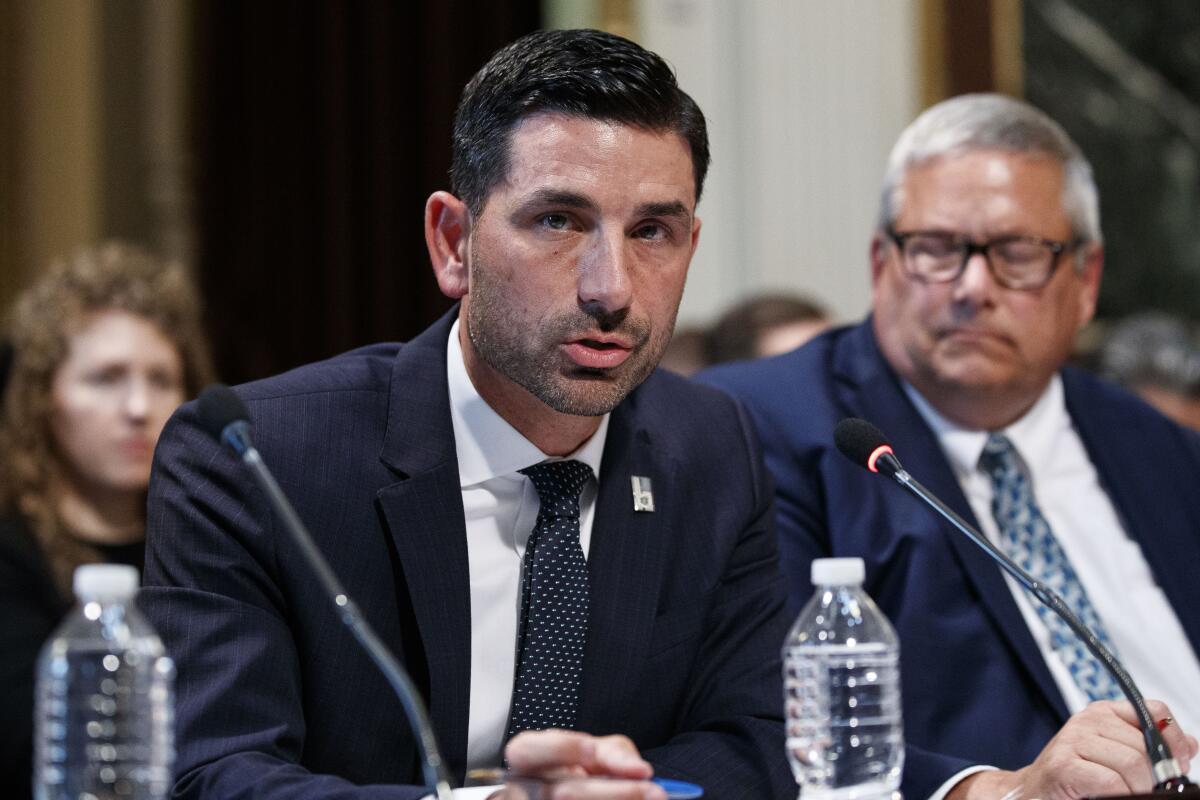Homeland Security watchdog warns that a lack of permanent leadership hurts the agency

- Share via
WASHINGTON — A lack of permanent leadership and high attrition under the Trump administration is hurting the federal government’s third-largest agency, the Homeland Security Department’s inspector general warned in a new report.
The agency’s internal watchdog ranked the leadership vacancies and hiring difficulties among the most serious challenges facing the Homeland Security Department in the annual report. As of the end of September, “acting” officials filled almost one-third of senior leadership positions, according to the report, which is required by Congress to conduct oversight of the agency and its roughly 240,000 employees.
“Unfortunately, many of these senior leadership positions continue to suffer from a lack of permanent, presidentially appointed and Senate-confirmed officials,” the inspector general wrote in the report released Monday.
More broadly, the report stated, the Homeland Security Department work environment is “marked by high attrition, changing mandates, and difficulties implementing permanent plans, procedures and programs.”
While stating that Homeland Security had “limited time” to review a draft of the report, an agency representative wrote to the inspector general that a “high-level review” assessed that his findings “generally comport with challenges the department is already aware of and working to address.”
Homeland Security, with a broad mission that includes tasks as disparate as counterterrorism and disaster response, has seen record turnover under President Trump, troubling both the president’s critics and his allies.
“The churning of leadership at DHS is concerning,” Sen. John Cornyn (R-Texas) recently told The Times.
Homeland Security rank and file — and in particular Customs and Border Protection, its main law enforcement branch, which includes the Border Patrol — have long struggled with retention. But the inspector general suggested those challenges have been exacerbated by Trump’s leadership purge.
“Since its inception, DHS has had difficulties ensuring it can expeditiously hire and retain highly qualified workers,” the report stated. “This situation is exacerbated by changes and vacancies in senior leadership, which are often beyond DHS’ control.”
In its first days, the administration issued an executive order mandating the hiring of 15,000 officers and agents. But nearly three years later, the agency has spent millions toward the effort and has not yet met even the minimum staffing levels set by Congress, much less the required surge, according to the report. After 10 months under one hiring contract, Customs and Border Protection had paid Accenture $13.6 million for the company to process only two accepted job offers. After criticism from overseers, the contract was canceled.
The continued personnel issues come amid the highest numbers of migrants arriving at the border in more than a decade, with more than 850,000 apprehensions. While numbers recently have decreased, coordination gaps between the agencies have hindered an effective response, as well as oversight, the inspector general’s report noted.
The inspector general also identified a continued lack of procedures to address employee misconduct. In July, at least 70 current and former Customs and Border Protection personnel came under investigation as part of an administrative probe into a secret Facebook group, first reported by ProPublica. In the group, members used dehumanizing and derogatory language toward Latina members of Congress and deceased migrants.
Approaching the 2020 presidential election, the inspector general said the department, which is charged with protecting the country’s election infrastructure, hasn’t completed plans to identify and respond to emerging threats, despite federal requirements to do so. The report specifically cited “senior leadership turnover and a lack of guidance” as obstacles.
Trump has said he likes keeping officials in “acting” positions rather than nominating them to permanently fill posts and face the Senate confirmation process, believing it provides him more flexibility.
But particularly at Homeland Security — an agency central to Trump’s primary political agenda of restricting immigration — the administration has begun to reach the limits of federal law, and, according to the inspector general’s report, functionality.
Acting Homeland Security chief Kevin McAleenan recently stepped down after six months, despite having never been formally nominated.
Just before his exit, McAleenan named Chad Wolf, a close aid to McAleenan’s predecessor, to an undersecretary role. After the Senate confirmed Wolf for that post on Wednesday, Trump named him as his next acting secretary.
Ken Cuccinelli, acting head of Citizenship and Immigration Services, was tapped as Wolf’s No. 2. That move was widely seen as positioning Cuccinelli, an immigration hardliner, to take over the top post.
Trump’s own Justice Department said he couldn’t pick Cuccinelli to head the department because of the Federal Vacancies Act. The law generally dictates that succession in government agencies must follow seniority among Senate-confirmed officials, and limits “acting” roles.
Additionally, lawmakers are asking for an emergency review of whether McAleenan’s tenure violated a federal statue, calling into question both Wolf’s and Cuccinelli’s selections as well.
If Trump ultimately nominates Cuccinelli as Homeland Security secretary, Republican senators whom Cuccinelli once tried to unseat have made clear he would face stiff opposition.
“He’s got some history,” Cornyn said. “Memories are long around here.”
For his part, Cuccinelli said at a recent media breakfast before the report’s release that the vacancies in permanent leadership at Homeland Security aren’t negatively affecting the agency.
“I don’t think it hurts at all, really,” he said.
More to Read
Get the L.A. Times Politics newsletter
Deeply reported insights into legislation, politics and policy from Sacramento, Washington and beyond. In your inbox twice per week.
You may occasionally receive promotional content from the Los Angeles Times.











